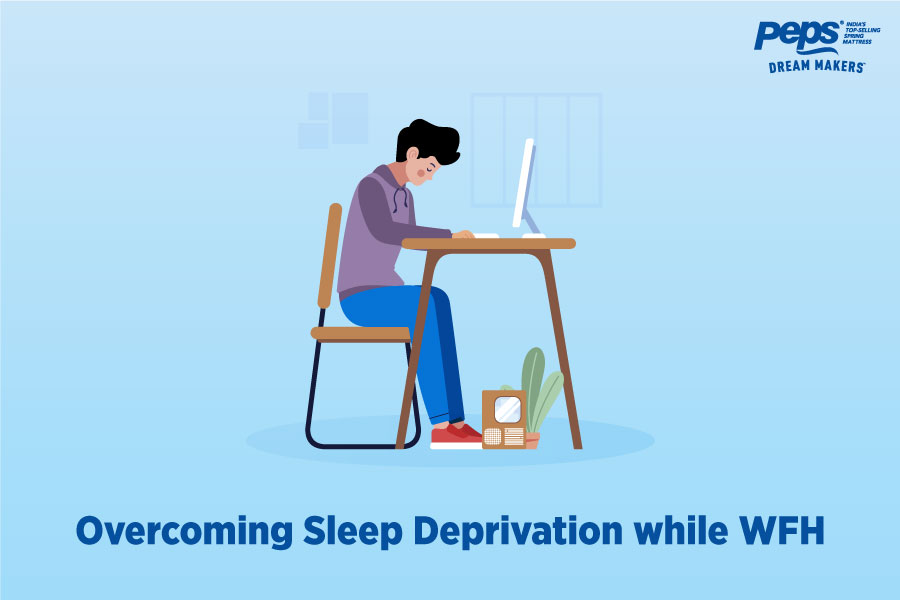
The global onslaught of COVID-19 has changed many things, and this includes where people will have work from too. Quite a few multi-national companies have shut their offices to help their employees stay safe, in their homes, against what seems to be the most viral infection yet.
So most Indians are working from home. But this is not a new concept at all. Many entrepreneurs have built rewarding careers while working from home before the Coronavirus pandemic. Thanks to compact light-weighted laptops and access to high-speed internet, switching to the WFH mode was not hard, at least technically. But add to this the absence of domestic help, an increasing workload, the anxiety brought forth by the uncertainty during a global pandemic, the circumstances can look grim too quickly. Before you know it, one thing affects the other, and the result? Sleep deprivation.
Has it been hard to get at least 7-8 hours of good sleep for you? Are you finding it challenging to maintain your sleep timings? Have you been struggling with focus during the day? If your answer is yes to any of these questions, you could use some help to get your sleep cycle back on track.
So what’s the hack? How can you nail WFH without feeling sleep deprived? Here are a few steps that can help:
- Schedule your day:
Scheduling can seem obvious, but it can make a huge difference in how your overall day is experienced. From giving you a sense of all the tasks that need to be done to helping you understand how you can go about completing them, scheduling can help you get things done during the day within your working hours. Putting all items down on paper will make you aware of the things that are in your control and can also help you measure your efficiency at the end of the day. One crucial advantage of scheduling is that it also allows you to prioritise your well being. So go ahead and plan how your typical day should look.
- Prioritise sleep:
The importance of sleep cannot be overstated, and a set time to hit the bed is critical. Numerous studies by renowned universities and scholars from around the world have shown that sleep is crucial for physical and mental well-being. It’s important to remember that a sleepless night is not a badge of honour but can lead to severe problems in the future. Whenever you face a situation where work needs to be done overnight, speak with your team or manager to adjust the deadline to the next day. A good night’s sleep will not only help your body and mind rest but will also refresh you to work with new ideas and may even enhance the quality of your work.
- Have dedicated spaces for work and sleep:
Studies have shown that sleeping and working in the same area can affect your sleep and productivity, as the mind can find it difficult to switch from one situation to the other. But if there is a dedicated space for work and another for sleeping, then it’s easier for the brain to adapt. It can also be difficult to achieve focus and efficiency if you are trying to work from your bedroom. Chances are you’ll feel sleepy. Therefore, being able to sleep without interruptions will require you to have spacial and timely boundaries. This will also help remove distractions while you churn out work.
- Become more mindful:
Mindfulness is the act of bringing one’s full attention to experiences in the present moment without any judgements and can be practised while meditating, exercising, or even walking. It can also be practised while working by focusing on the task you are performing. This will help you clear your mind of unwanted thoughts and even anxiety about imagined circumstances. So take a deep breath and begin your mindfulness journey today. Mindfulness has been shown to calm the mind, which is a massive advantage if you’re trying to experience sound sleep. It’s certainly wise to amplify your awareness during these difficult times.
- Socialise with your near and dear ones:
COVID-19 has introduced the world to quite a few buzzwords and the most popular among them is social-distancing. The term signifies the act of physically distancing oneself from other individuals to avoid viral infection. However, this does not mean that one stops all social interaction. Thankfully we live in a world where video calls have become a part of everyday life. So we should use every opportunity to maintain healthy connections through technology. But how does this affect sleep? Well, positive social interactions can help us realise that we are not alone. They are also an opportunity to share serious concerns with others, which can help reduce anxiety and fear, and as a result, enhance our quality of sleep.
So next time you feel like working from home is affecting your sleep, know that you can choose to do a few things differently the next day. Don’t stop trying different approaches until you find ones that work for you.

